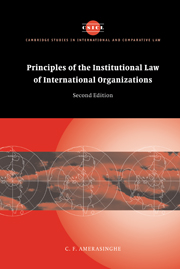Book contents
- Frontmatter
- Contents
- Preface
- List of abbreviations
- Table of cases
- 1 Introduction
- 2 Interpretation of texts
- 3 Legal personality
- 4 Membership and representation
- 5 Non-Judicial organs of organizations
- 6 Acts of non-judicial organs: their legal effect
- 7 Acts of non-judicial organs: the doctrine of ultra vires
- 8 Judicial organs
- 9 The internal law: employment relations
- 10 Privileges and immunities
- 11 Financing
- 12 Responsibility to and of international organizations
- 13 The liability of member states vis-à-vis third parties
- 14 Amendment of constitutions
- 15 Dissolution and succession
- 16 The settlement of disputes
- Index
- Cambridge Studies in International and Comparative Law
12 - Responsibility to and of international organizations
Published online by Cambridge University Press: 10 December 2009
- Frontmatter
- Contents
- Preface
- List of abbreviations
- Table of cases
- 1 Introduction
- 2 Interpretation of texts
- 3 Legal personality
- 4 Membership and representation
- 5 Non-Judicial organs of organizations
- 6 Acts of non-judicial organs: their legal effect
- 7 Acts of non-judicial organs: the doctrine of ultra vires
- 8 Judicial organs
- 9 The internal law: employment relations
- 10 Privileges and immunities
- 11 Financing
- 12 Responsibility to and of international organizations
- 13 The liability of member states vis-à-vis third parties
- 14 Amendment of constitutions
- 15 Dissolution and succession
- 16 The settlement of disputes
- Index
- Cambridge Studies in International and Comparative Law
Summary
A question of great importance for the law of international organizations relates to the responsibility of organizations and responsibility to organizations, vis-à-vis states and other international persons in particular. Where organizations have international personality, it may be asked whether they are responsible internationally for violations of the law, on what basis they are responsible and how this responsibility is enforced. The same questions may be posed in respect of international responsibility to organizations. In this chapter the issues surrounding the substantive law of responsibility will be discussed. Something must also be said first about the law that governs transactions to which international organizations are party, whether actively or passively. However, only an outline of the issues and their resolution can be given here. The question of enforcement (settlement of disputes) is reserved for Chapter 16, where issues relating to the procedure for bringing claims will also be addressed.
There is not much international judicial precedent on the international responsibility of or to international organizations, though the practice that has been followed since the creation of the League of Nations and particularly after the Second World War has rested on certain assumptions. The principal, if not the only, international judicial case relating to the subject is the Reparation Case, brought before the ICJ. The matter has also been discussed by text writers, but not extensively.
- Type
- Chapter
- Information
- Publisher: Cambridge University PressPrint publication year: 2005



